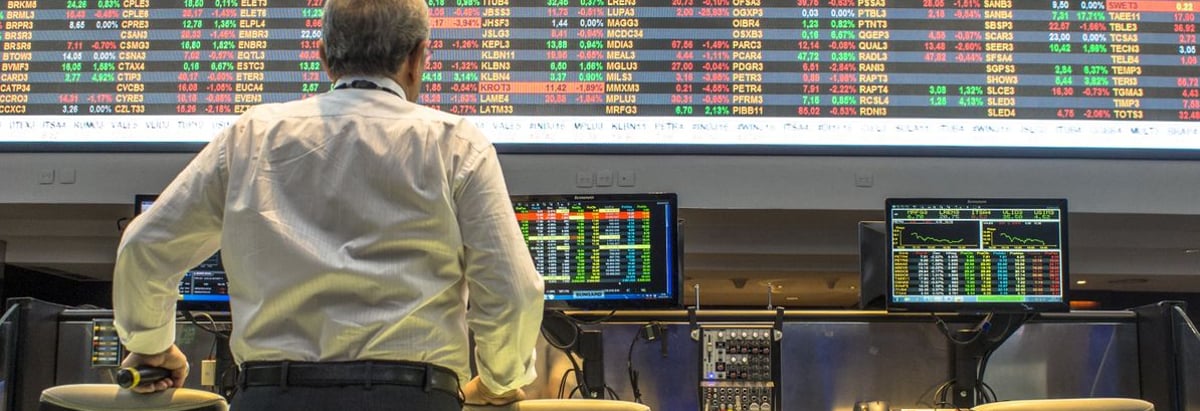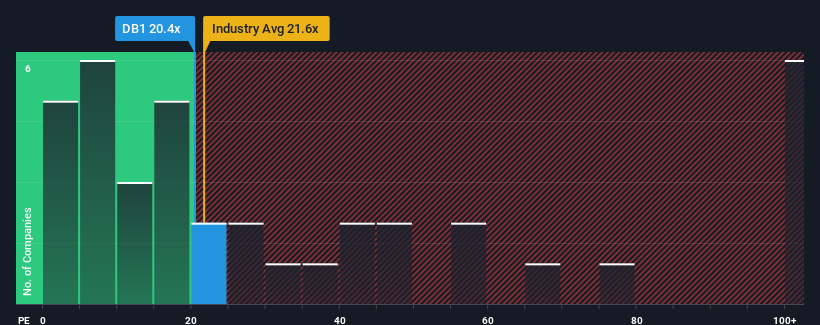
When close to half the companies in Germany have price-to-earnings ratios (or "P/E's") below 17x, you may consider Deutsche Börse AG (ETR:DB1) as a stock to potentially avoid with its 20.4x P/E ratio. Nonetheless, we'd need to dig a little deeper to determine if there is a rational basis for the elevated P/E.
With its earnings growth in positive territory compared to the declining earnings of most other companies, Deutsche Börse has been doing quite well of late. The P/E is probably high because investors think the company will continue to navigate the broader market headwinds better than most. If not, then existing shareholders might be a little nervous about the viability of the share price.
See our latest analysis for Deutsche Börse

How Is Deutsche Börse's Growth Trending?
Deutsche Börse's P/E ratio would be typical for a company that's expected to deliver solid growth, and importantly, perform better than the market.
Taking a look back first, we see that the company managed to grow earnings per share by a handy 15% last year. Pleasingly, EPS has also lifted 58% in aggregate from three years ago, partly thanks to the last 12 months of growth. So we can start by confirming that the company has done a great job of growing earnings over that time.
Turning to the outlook, the next three years should generate growth of 6.6% each year as estimated by the analysts watching the company. That's shaping up to be materially lower than the 14% per annum growth forecast for the broader market.
With this information, we find it concerning that Deutsche Börse is trading at a P/E higher than the market. It seems most investors are hoping for a turnaround in the company's business prospects, but the analyst cohort is not so confident this will happen. There's a good chance these shareholders are setting themselves up for future disappointment if the P/E falls to levels more in line with the growth outlook.
The Final Word
Typically, we'd caution against reading too much into price-to-earnings ratios when settling on investment decisions, though it can reveal plenty about what other market participants think about the company.
We've established that Deutsche Börse currently trades on a much higher than expected P/E since its forecast growth is lower than the wider market. When we see a weak earnings outlook with slower than market growth, we suspect the share price is at risk of declining, sending the high P/E lower. This places shareholders' investments at significant risk and potential investors in danger of paying an excessive premium.
It is also worth noting that we have found 1 warning sign for Deutsche Börse that you need to take into consideration.
Of course, you might also be able to find a better stock than Deutsche Börse. So you may wish to see this free collection of other companies that have reasonable P/E ratios and have grown earnings strongly.
New: Manage All Your Stock Portfolios in One Place
We've created the ultimate portfolio companion for stock investors, and it's free.
• Connect an unlimited number of Portfolios and see your total in one currency
• Be alerted to new Warning Signs or Risks via email or mobile
• Track the Fair Value of your stocks
Have feedback on this article? Concerned about the content? Get in touch with us directly. Alternatively, email editorial-team (at) simplywallst.com.
This article by Simply Wall St is general in nature. We provide commentary based on historical data and analyst forecasts only using an unbiased methodology and our articles are not intended to be financial advice. It does not constitute a recommendation to buy or sell any stock, and does not take account of your objectives, or your financial situation. We aim to bring you long-term focused analysis driven by fundamental data. Note that our analysis may not factor in the latest price-sensitive company announcements or qualitative material. Simply Wall St has no position in any stocks mentioned.
About XTRA:DB1
Deutsche Börse
Operates as an international exchange organisation in Germany, Rest of Europe, America, and the Asia-Pacific.
Established dividend payer with adequate balance sheet.

